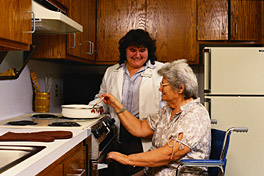Caring for an elderly loved one is physically and emotionally draining for family caregivers. It is extremely difficult for one individual to maintain this 24/7 job without needing a few hours break each day or a vacation once in a while. Seeking outside assistance to allow for a break from caregiving is vital to avoid burnout. These breaks, called respite care, can help a caregiver:
- Restore their balance
- Improve their energy
- Reduce their stress levels.
How to Select Respite Care
There are many things a caregiver should consider when looking for respite services, such as other family caregivers, independent caregivers, out-of-home respite care programs, and in-home respite services. Below are tips and ideas on how to select the right respite care solution for your family.
1. Family and friends. You may be the main caregiver, but other family or friends may be willing to share the responsibilities involved in the constant care. The most important aspect of finding a family member or friend for support is to communicate your need as the primary caregiver for a break. To do this, we recommend the following steps:
- Step 1: Keep open communication throughout the entire caregiving process. Constantly communicate what’s happening so that everyone is up-to-date on the condition and care of your loved one. This will also increase the family’s level of appreciation for the amount of dedication and care being given.
- Step 2: Ask for help. Caregivers need to be able to get assistance before it is too late. A burned-out caregiver cannot provide the quality care needed for optimum healing at home. Perhaps others can take turns every other day for a few hours to allow you to take a stress-free grocery store trip or movie.
- Step 3: Join a support group. Whether you receive assistance from your friends and family or not, support groups can offer reassurance, tips, success stories, and basic companionship.
2. Independent Caregivers. If you choose to hire independent care providers, it is very important to do proper screening and reference checking to help you select the right person. What do you look for?
- Ensure they have the proper skill and experience level to provide the care needed.
- Do a background check on your potential caregiver.
- Make sure your loved one and the potential caregiver are compatible. They have to be able to communicate and trust each other.
- Once you choose the right person, discuss compensation and expectations. Of course, never pay in advance for their services.
3. Out-of-Home Caregivers. Occasionally, family members may opt for facilities or adult day cares to provide supervision and care while the main caregiver takes a break. Depending on your location, there might be many options to choose from. Below are short descriptions of the 2 types of services for out-of-home caregiving.
Adult Day Care
- Adult Day Care Centers usually operate during regular business hours.
- Some can offer a range of planned activities that promote socializing and well-being.
- Depending on the length of stay, some centers will offer meals that adhere to any specialized diets or restrictions.
- They allow your loved one to get out of the house.
Residential Programs
- They offer a more flexible timeframe, with 24-hour care and multiple day options.
- Their atmosphere will be more comfortable than adult day care and more similar to a real home environment.
- Residential facilities usually offer interactive activities and entertainment.
4. In-Home Care. Home care agencies, such as Compassionate Care Home Health Services, Inc, provide respite care in the comfort of your loved one’s home. When the main caregiver needs a break, in-home care agencies send in an aide to assist with the care for as long as necessary. We compiled a list of questions you should consider when looking for an agency to help with your respite care. Learn more about our respite care services.
Summary
Caring for yourself becomes even more important when you are responsible for the care of a loved one. Don’t let yourself become burned out. Seeking help doesn’t mean you’ve failed as a caregiver. Respite care can help your loved one receive the highest quality of care while they recover, and ensure your continual good health as well.

